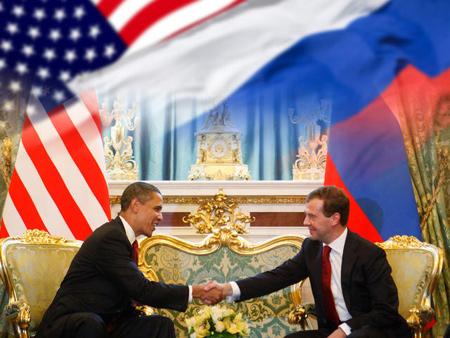Don’t Waste Kyrgyzstan Crisis
My latest for The National Interest, “Turmoil in Kyrgyzstan,” is posted. The key bits:
There are no good options here. Neither Russia nor the United States would welcome the unilateral entry of the other. Nor would either welcome a regional domino reaction to tens of thousands of refugees flooding across the “stans” of the former Soviet Union.
So, why not some sort of joint venture? Not only would it ally mutual fears but it would provide mutual benefit, both in terms of the crisis at hand and the much ballyhooed “reset.” Whether the mutual cooperation took the form of an ad hoc peacekeeping force or leadership through the UN Security Council or the OSCE—or, dare I say it, NATO and its Euro-Atlantic Partnership Council—is really a logistical problem to be worked out.
As TNI’s editors noted yesterday, Washington Post columnist David Ignatius is thinking along similar lines. He argues that “Russia and America should be natural partners in Central Asia. Certainly, they share the same enemies—the militant Islamic groups and criminal gangs that threaten stability in the region.” And, he hopes, maybe working together here would help get cooperation on Iran.
While I wouldn’t hold my breath on that one, to quote Rahm Emanuel, “You never want a serious crisis to go to waste.” Certainly, this is a classic “opportunity to do things you think you could not do before.” And it’s something that actually needs to get done.
Much more at the link.

Magical thinking I’m afraid, James. What you’re suggesting is that the Russians abandon a goal they’ve embraced since the 17th century: control over their near abroad. Whether it’s labelled “re-building the Soviet Union” or plain old Russian nationalism, that’s the project and our involvement in Central Asia in any way, shape, or form threatens it.
You’re right. It would be better for everybody if Russia and the United States cooperated in mutual self interest. Doing so would require Russian leaders to abandon habits of thought that were old in their grandfathers’ grandfathers’ time. Even so it might be possible if the U. S. were operating from a position of strength. We aren’t, either practically or rhetorically.
The Russians undoubtedly interpret President Obama’s rhetoric as a sign of weakness and our inability to effect decisive gains against Iran, Pakistan, or the Taliban the same way. They won’t back a weak horse.
A distinct possibility, Dave.
The Russians’ reluctance thus far to intervene, though, suggests that they’re leery of this mess. Working with the international community here might be a way to both assert their presence and yet avoid some of the downsides. Whether they’ll actually do it, though, is another thing.
It’s just possible that the Russians have learned from their Afghan adventure (and ours) that control is illusory. Their refusal to exploit this crisis thus far tends toward that conclusion. I don’t think it’s magical thinking to hope that the Russians have grown wiser since the days of the Czars and Stalin. After all, we’ve learned a bit about the limits of power in mountainous mental asylums ourselves.
Rather it suggests that they don’t really care how bad things get in Kyrgyzstan so long as it doesn’t turn against them.
Michael, the Russians have shown no reluctance to intervene militarily in the affairs of countries in their near abroad over the last couple of years, cf. Georgia. I read the Russian language newspapers regularly. Russian nationalism shows no signs of retreating and part of its definition sure seems to be controlling its neighbors.
Compared to what baseline? Yes, they probed in Georgia. By the same token they’ve kept military hands-off on Ukraine, the Baltic states, Poland.
The Russian obsession with a ring of vassal states is a throw-back to a military reality that no longer exists. There is zero chance of anyone launching a tank column toward Moscow from anywhere. The whole idea of buffer states is militarily irrelevant.
In fact, any attempt by the Russians to impose a new vassalage on their border states would buy them the very trouble they must hope to avoid. Look at what Chechnya brought them. Surely the Russians are capable of understanding that ‘Stans in chaos are more dangerous than stable ‘Stans.
The Russian interest is logically in stable, non-hostile, trouble-free states on their borders. They would profit from trade, from access to resources, so on, and have nothing whatever to gain from imposing direct rule or a resented collaborationist regime in the ‘Stans. To that end the logical move is to follow whichever path is most likely to lead to stability rather than a path to chaos or a path to troublesome domination.
Although I grant that logic doesn’t always carry the day.
I do not regularly read Russian papers, only excerpts gathered by others, but I do not think from my understanding that being recognized as an equal, partnering to resolve something like this would run against the nationalist strain. Besides wanting to control its near neighborhood, my sense has been that there is nostalgia for the good old days of Soviet dominance/respect. I dont think this is beyond the pale and from the US POV makes good sense.
Steve